Did you know that Algeria is the largest country in Africa? This North African nation is home to more than 40 million people and is rich in history and culture. Let’s explore some interesting facts about Algeria!
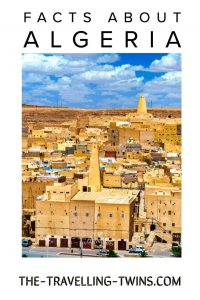
Facts about Algeria
The official name of Algeria is the People’s Democratic Republic of Algeria.
Algeria is the largest country in Africa, with a total country area of 2,381,741 square kilometers.
The capital of Algeria is Algiers, which is also the largest city in the country.
Algerian Population facts
Algeria is home to more than 40 million people. The population is ethnically and religiously diverse, with Muslims making up the majority of the population.
National Animal
The National Animal of Algeria is the fennec fox. Fennec Fox is a small desert fox found in North Africa and the Arabian Peninsula. Fennec is world’s smallest fox. They have very large ears, which help them keep cool in the desert heat.
The National Football team is called Les Fennecs – Desert Foxes.
Algerian Flag and Anthem
The Algerian flag got adopted in 1962 after Algeria gained independence from France. The flag is divided vertically into green and white stripes with a red crescent and star representing Islam.
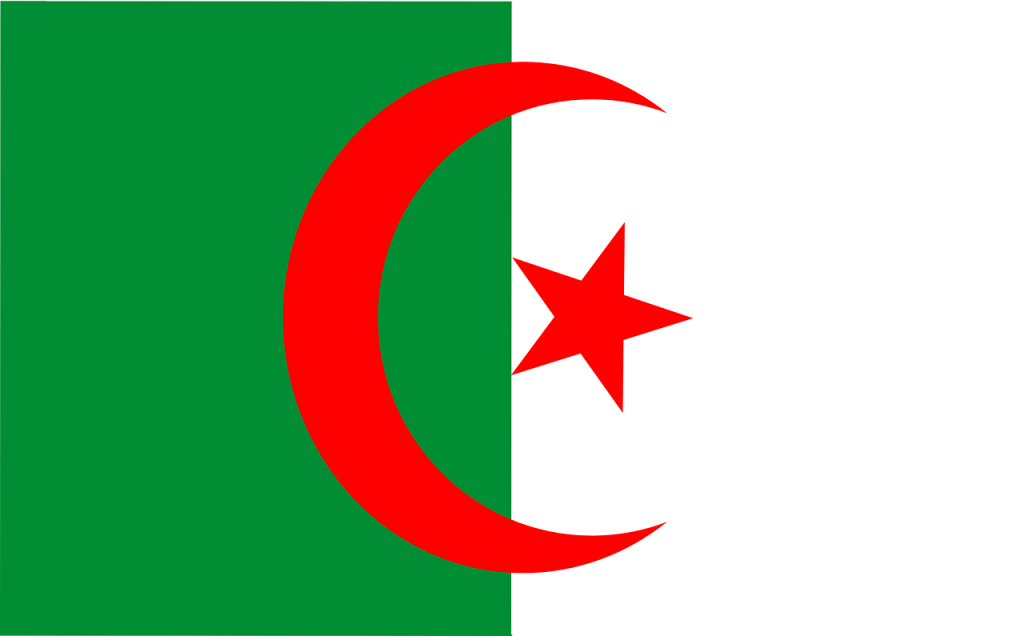
The Algerian national anthem, known as “Kassaman” (“We Pledge”), was adopted in 1962, after Algeria won independence from France. The lyrics were written by Muhammad Khaïr-Eddine, and the music was composed by Mohamed Triki. The anthem reflects the struggles of the Algerian people, as well as their pride in their nation.
Religion in Algeria
The official religion of Algeria is Islam. 96% of the Algerian population is practising Islam. Sunni Islam is the largest branch, with 89% of Muslims, while the remaining 11% are Shia. Algeria also has Christian and Jewish minorities.
Sharia law is the Islamic legal system, while the French court system is based on civil law both coexist in Algeria.
Official Languages
Arabic is the official language of Algeria. French is also an official language in Algeria, and it is spoken by a large portion of the population.
Arabic Dialect called Algerian Arabic is used by love 50% of the population.
The currency of Algeria is the Algerian Dinar.
Algeria Geography facts
Algeria is located in North Africa and borders Tunisia, Libya, Niger, and Mali.
Algeria is the largest country in Africa and the 10th largest in the world.
The country is mostly desert (Sahara desert), with the exception of the fertile Mediterranean coastline.
The Sahara Desert covers up about 95% of Algeria.
Algeria Climate facts
The climate in Algeria is mostly hot and dry, with a few rainy months on the Mediterranean coast.
The desert has extreme temperatures, with highs of over 50 degrees Celsius and lows of below 0 degrees Celsius.
Algeria Culture facts
Algeria is home to a rich and diverse culture that is influenced by several different cultures, including Berber, Arab, French, and Spanish.
Algeria is known for its traditional music, which is a mix of Arab, Berber, and French influences. Algerian music is often played on the oud (a type of lute), violin, and riq (a type of tambourine).
Algeria is also home to a number of traditional dances, such as the Algerian Chaabi, which is a mix of Berber and Arab influences.
Neolithic Drawings
Algeria’s Tassili National Park is home to some of the most remarkable pre-historic rock art in the world. The sandstone formations of the Tassili Plateau have been eroded over time into a series of strange and wonderful shapes, and these natural canvases have been used by local people for thousands of years to record their history and beliefs.
The earliest drawings date back to the Neolithic period, and depict animals, hunting scenes, and everyday life. Later artists added their own visions of the world, often superimposing humans and animals to create mythical creatures.
Algerian food
Algerian food is a mix of Mediterranean, African (Moroccan food) and French cuisine. Popular dishes include couscous, merguez (spicy sausage), and harissa (a chili paste).
Algerian dates are one of the sweetest and yummiest in the world.
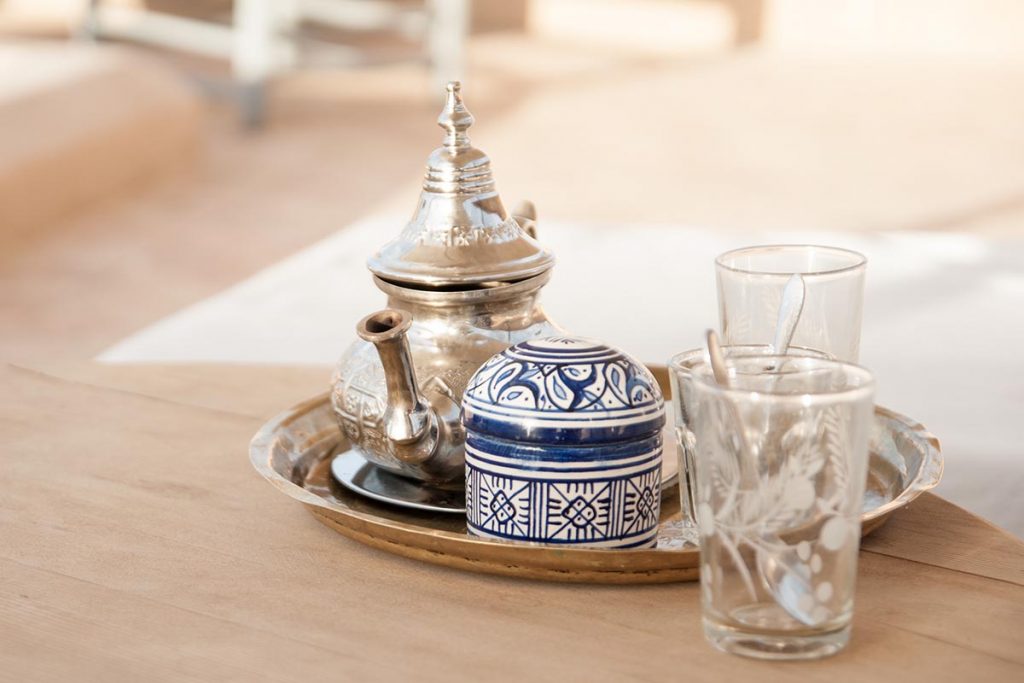
One of the traditional customs when visiting an Algerian home is to be greeted with mint tea and dates. This is a sign of hospitality and friendship. Be sure to try some of the delicious Algerian food while you’re there!
Mint tea, called Etzai here, is one of the most popular gifts in Algeria.
Algeria Economy facts
Algeria has a diversified economy, with sectors such as agriculture, energy, industry, and tourism all contributing to the country’s GDP. The country is a member of the OPEC and is one of the world’s leading producers of fossil fuels, oil and gas.
Gas exports are a major source of revenue for many countries, including Algeria. In 2016, Algeria exported over $10 billion worth of natural gas. This made up over 60% of the country’s total exports.
The agriculture sector in Algeria employs about 15% of the population and contributes to about 5% of the GDP. The main crops grown in Algeria are wheat, barley, tomatoes, potatoes, and onions.
The tourism industry is also a significant contributor to the Algerian economy.
Facts about Algerian History
Algeria is a country with a rich and fascinating history. The region has been inhabited by humans since prehistoric times, and the country has been ruled by a number of different empires and civilizations over the centuries.
Algeria was part of the Ottoman Empire from the 16th for over 300 years until the XIX century, when the country became a French Colony.
In 1962, Algeria gained its independence from France after a bloody war of independence. The country has since been ruled by a series of dictators and has seen civil unrest and violence.
Algerian Women facts
Algerian women have a very strong presence in the country’s culture and society as opposed to other Islamic Countries.
Women have made significant contributions to the country in a number of different fields, including politics, business, and education. 60% of the student population, 60% of Algeria’s judges and 70% of Algerian lawyers are women.
UNESCO World Heritage Sites in Algeria
There are seven UNESCO world heritage sites located in Algeria, including the archaeological site of Tipasa, the Tassili n’Ajjer National Park, and the Al Qal’a of Beni Hammad, M’Zab Valley.
The most famous Unesco World Heritage Site is the Kasbah of Algiers.
Algerian Nobel Prize Winners
Albert Camus won Nobel Prize for Literature in 1957.
Claude Cohen-Tannoudji won the Nobel Prize in Physics in 1997.
Interesting Facts about Algeria that you may not know!
The culture and history of Algeria are rich and varied, owing in part to the country’s location between the Mediterranean Sea and the Sahara Desert.
Debt-free Country: Algeria is one of few countries which don’t have any external debt.
The country has the largest reserves of natural gas in Africa
Algeria is home to the oldest continuously inhabited city in the world, Tadrart Acacus
The Roman ruins of Djemila are among the most well-preserved in North Africa
In 2011, Algeria experienced a popular uprising against the government known as the Arab Spring.
Algeria won a total of five gold medals at the Summer Olympics.
Algeria facts Summary
We hope you enjoyed learning these facts about Algeria! For more information about other African Countries be sure to check out our other articles – Facts about Morocco,
Interesting Fact about Algeria – Pin it for Later
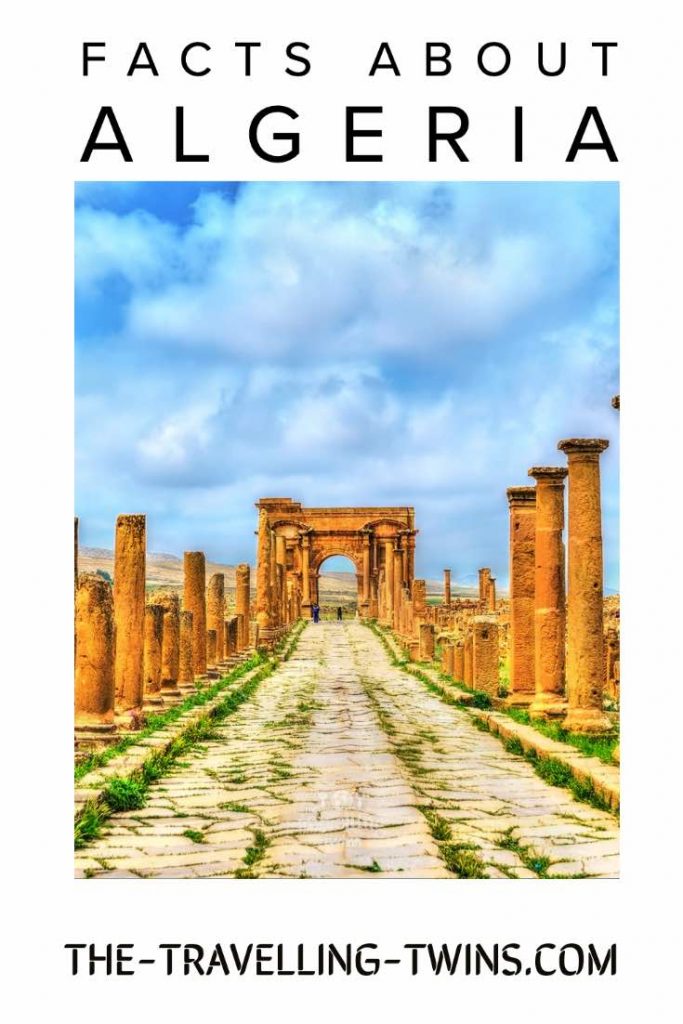
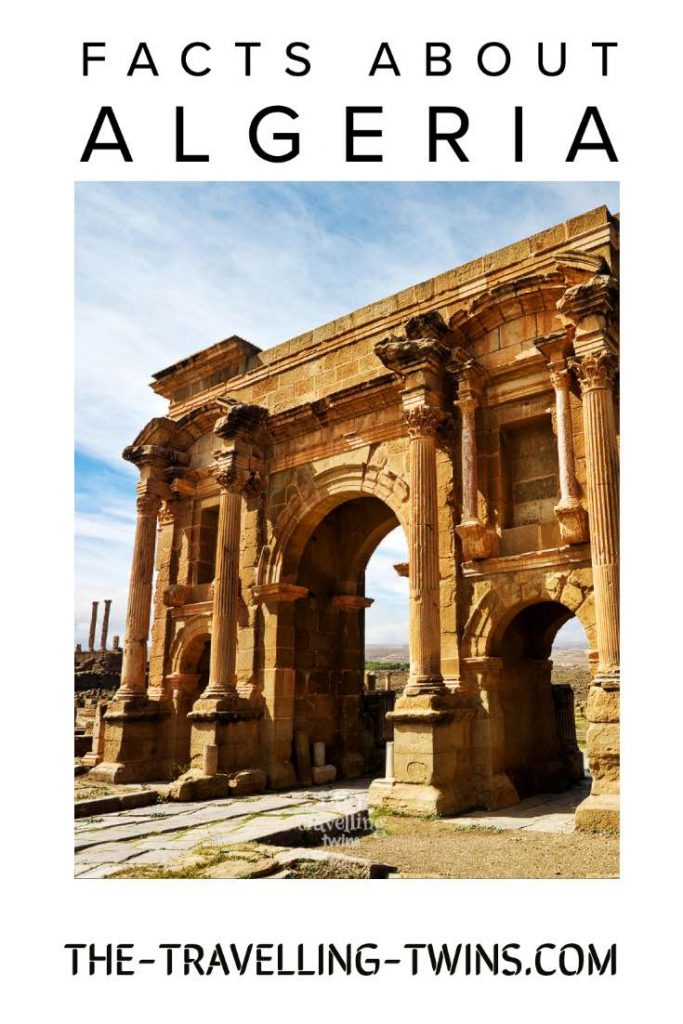
Privacy Policy Disclaimer
This website uses affiliate links for income and support.
If you like our website, please consider using these links. You will be directed to the vendor, and we will get a small commission on your purchase price at no increased cost to you.
We have researched facts stated here as far as practicable but please check anything critical before committing your time and money. We do not claim any special knowledge or expertise, and we are not consultants for our readers.